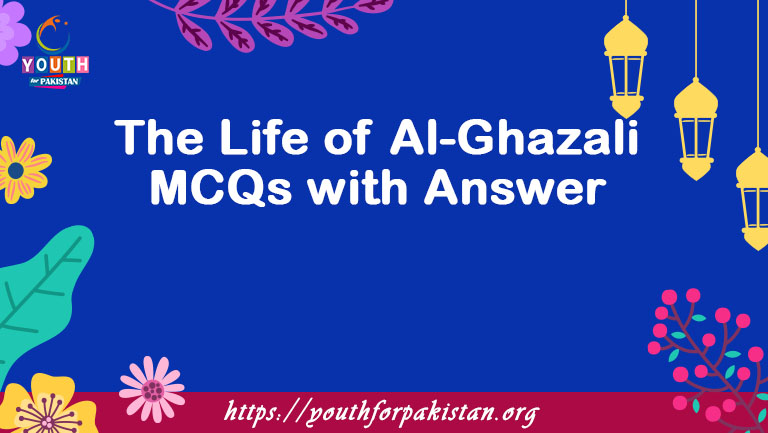The following are The Life of Al-Ghazali MCQs with answers related to Islamic Studies. We have arranged the most important and repeated MCQs in all the competitive examinations. The students can clear their concepts for The Life of Al-Ghazali MCQs online quiz by attempting these.
The Life of Al-Ghazali Online MCQs with Answers
What is the full name of Al-Ghazali, the famous Islamic scholar and philosopher?
a) Abu Bakr Al-Ghazali
b) Ibn Khaldun
c) Abu Hamid Al-Ghazali
d) Al-Farabi
Al-Ghazali is best known for his contributions to which field of Islamic thought?
a) Medicine
b) Philosophy
c) Engineering
d) Poetry
Al-Ghazali’s most famous work, “The Revival of Religious Sciences,” is also known as __________.
a) “The Book of Healing”
b) “The Alchemy of Happiness”
c) “The Incoherence of the Philosophers”
d) “The Book of Guidance”
In which century did Al-Ghazali live and work?
a) 6th century CE
b) 10th century CE
c) 12th century CE
d) 16th century CE
Al-Ghazali was born in which present-day country?
a) Iran
b) Saudi Arabia
c) Iraq
d) Afghanistan
What is the term for Al-Ghazali’s transformation from a prominent scholar to a Sufi mystic after experiencing a spiritual crisis?
a) Inquisition
b) Apostasy
c) Illumination
d) Spiritual awakening
Al-Ghazali’s philosophy emphasized the importance of __________ in Islamic thought.
a) Rationalism
b) Mysticism
c) Atheism
d) Materialism
Which famous Islamic philosopher’s ideas did Al-Ghazali criticize in his work “The Incoherence of the Philosophers”?
a) Ibn Khaldun
b) Avicenna (Ibn Sina)
c) Al-Farabi
d) Al-Razi (Rhazes)
Al-Ghazali argued that philosophical reasoning alone was insufficient for understanding __________.
a) Astronomy
b) Ethics
c) Theology
d) Medicine
What is the term for Al-Ghazali’s concept of “knowledge of certainty” or “yaqin” in Islamic philosophy?
a) Ilm al-Kalam
b) Ilm al-Yaqin
c) Ilm al-Haqiqah
d) Ilm al-Aql
Al-Ghazali’s “The Incoherence of the Philosophers” argued that some Greek philosophical ideas contradicted __________.
a) Islamic theology
b) Scientific discoveries
c) Political ideology
d) Mathematical principles
Al-Ghazali’s work “The Deliverance from Error” describes his personal journey from __________.
a) Agnosticism to atheism
b) Doubt to certainty
c) Polytheism to monotheism
d) Poetry to philosophy
Which school of Islamic jurisprudence did Al-Ghazali follow in his legal writings?
a) Hanafi
b) Maliki
c) Shafi’i
d) Hanbali
Al-Ghazali’s teachings emphasized the importance of __________ in the pursuit of spiritual knowledge.
a) Humility
b) Wealth
c) Physical strength
d) Political power
What is the term for the Islamic practice of self-purification and self-discipline, which Al-Ghazali emphasized in his writings?
a) Ijtihad
b) Jihad
c) Tazkiyah
d) Fiqh
Al-Ghazali’s influence extended to various fields, including __________.
a) Mathematics
b) Architecture
c) Astronomy
d) Poetry
Al-Ghazali’s work “The Alchemy of Happiness” explores the concept of happiness through __________.
a) Material wealth
b) Mystical experiences
c) Scientific discoveries
d) Political power
Al-Ghazali’s ideas had a significant impact on the development of __________ philosophy in the Islamic world.
a) Rationalist
b) Existentialist
c) Postmodernist
d) Sufi
What is the term for the Islamic mystical practice of “dhikr” or remembrance of God, which Al-Ghazali promoted?
a) Sama
b) Qawwali
c) Sufism
d) Salat
Al-Ghazali’s work “The Incoherence of the Philosophers” aimed to reconcile __________ with Islamic theology.
a) Mysticism
b) Philosophy
c) Poetry
d) Political ideology
In his later life, Al-Ghazali settled in which city, where he continued to write and teach?
a) Mecca
b) Medina
c) Baghdad
d) Damascus
Al-Ghazali’s emphasis on experiential knowledge and spirituality influenced the development of __________ within Islam.
a) The Hanbali school
b) The Sunni-Shi’a divide
c) Sufism
d) Political philosophy
What is the term for Al-Ghazali’s concept of “knowledge by presence” or “hudur” in Islamic philosophy?
a) Ilm al-Yaqin
b) Ilm al-Kalam
c) Ilm al-Tawhid
d) Ilm al-Hudur
Al-Ghazali’s writings on ethics and spirituality emphasized the importance of __________ as a path to God.
a) Asceticism
b) Rationalism
c) Materialism
d) Hedonism
What is the term for the Islamic practice of “muraqaba” or spiritual watchfulness, which Al-Ghazali encouraged?
a) Sufism
b) Jihad
c) Ijma
d) Fiqh
Al-Ghazali’s work “The Incoherence of the Philosophers” argued that philosophers could not prove the existence of __________ through reason alone.
a) God
b) Prophets
c) Angels
d) Humans
Al-Ghazali’s contributions to Islamic thought are often seen as a response to the challenges posed by __________ philosophy.
a) Sufi
b) Rationalist
c) Legal
d) Shi’a
Al-Ghazali’s spiritual journey and transformation were inspired by his reading of the works of which famous Islamic philosopher?
a) Ibn Rushd (Averroes)
b) Ibn Khaldun
c) Avicenna (Ibn Sina)
d) Al-Farabi
Al-Ghazali’s writings played a crucial role in bridging the gap between __________ and spirituality within Islamic thought.
a) Philosophy
b) Politics
c) Economics
d) Mathematics
What is the term for the Islamic practice of “tasawwuf” or Sufism, which Al-Ghazali advocated as a means of spiritual growth?
a) Jihad
b) Tawhid
c) Fiqh
d) Tasawwuf
Al-Ghazali’s teachings emphasized that the pursuit of knowledge should lead to __________.
a) Material wealth
b) Intellectual arrogance
c) Spiritual growth
d) Political power
Al-Ghazali’s influence extended to both Sunni and __________ Islamic traditions.
a) Shi’a
b) Sufi
c) Ibadi
d) Kharijite
Which of Al-Ghazali’s works is considered a foundational text in the study of Islamic spirituality and ethics?
a) “The Incoherence of the Philosophers”
b) “The Alchemy of Happiness”
c) “The Book of Healing”
d) “The Book of Guidance”
Al-Ghazali’s “The Incoherence of the Philosophers” argued that some Greek philosophical ideas contradicted __________.
a) Islamic theology
b) Scientific discoveries
c) Political ideology
d) Mathematical principles
Al-Ghazali’s teachings emphasized the importance of __________ in the pursuit of spiritual knowledge.
a) Humility
b) Wealth
c) Physical strength
d) Political power
What is the term for the Islamic practice of self-purification and self-discipline, which Al-Ghazali emphasized in his writings?
a) Ijtihad
b) Jihad
c) Tazkiyah
d) Fiqh
Al-Ghazali’s influence extended to various fields, including __________.
a) Mathematics
b) Architecture
c) Astronomy
d) Poetry
Al-Ghazali’s work “The Alchemy of Happiness” explores the concept of happiness through __________.
a) Material wealth
b) Mystical experiences
c) Scientific discoveries
d) Political power
Al-Ghazali’s ideas had a significant impact on the development of __________ philosophy in the Islamic world.
a) Rationalist
b) Existentialist
c) Postmodernist
d) Sufi
What is the term for the Islamic mystical practice of “dhikr” or remembrance of God, which Al-Ghazali promoted?
a) Sama
b) Qawwali
c) Sufism
d) Salat
Al-Ghazali’s work “The Incoherence of the Philosophers” aimed to reconcile __________ with Islamic theology.
a) Mysticism
b) Philosophy
c) Poetry
d) Political ideology
In his later life, Al-Ghazali settled in which city, where he continued to write and teach?
a) Mecca
b) Medina
c) Baghdad
d) Damascus
Al-Ghazali’s emphasis on experiential knowledge and spirituality influenced the development of __________ within Islam.
a) The Hanbali school
b) The Sunni-Shi’a divide
c) Sufism
d) Political philosophy
What is the term for Al-Ghazali’s concept of “knowledge by presence” or “hudur” in Islamic philosophy?
a) Ilm al-Yaqin
b) Ilm al-Kalam
c) Ilm al-Tawhid
d) Ilm al-Hudur
Al-Ghazali’s writings on ethics and spirituality emphasized the importance of __________ as a path to God.
a) Asceticism
b) Rationalism
c) Materialism
d) Hedonism
What is the term for the Islamic practice of “muraqaba” or spiritual watchfulness, which Al-Ghazali encouraged?
a) Sufism
b) Jihad
c) Ijma
d) Fiqh
Al-Ghazali’s work “The Incoherence of the Philosophers” argued that philosophers could not prove the existence of __________ through reason alone.
a) God
b) Prophets
c) Angels
d) Humans
Al-Ghazali’s contributions to Islamic thought are often seen as a response to the challenges posed by __________ philosophy.
a) Sufi
b) Rationalist
c) Legal
d) Shi’a
Al-Ghazali’s spiritual journey and transformation were inspired by his reading of the works of which famous Islamic philosopher?
a) Ibn Rushd (Averroes)
b) Ibn Khaldun
c) Avicenna (Ibn Sina)
d) Al-Farabi
Al-Ghazali’s teachings emphasized that the pursuit of knowledge should lead to __________.
a) Material wealth
b) Intellectual arrogance
c) Spiritual growth
d) Political power









